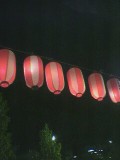
Beware of mamushi (a type of poisonous snake). In the mountains near my house.
Summer Break
I’m on break all this week and am taking the time to work on my late afternoon inverted snoring technique. Blogging will resume soon – see ya then!
Lanterns at Bon Odori

Lanterns at bon odori.
Free Games!
A long list of games that can be downloaded for free over at the anandtech forums:
CLICK ME HARD, BABY
A lot of these are older commercial games that the developers have released for free since they are no longer really profitable and it’s good publicity. It’s a cool thing for them to do.
Mulder, is that you?
This one’s for Michiko, who works at a patent office in Osaka:
Lawyers Unearth Early Patents
(registration required; get login and password at BugMeNot)
Two patent history nerds found the holy grail of the patent world, get ready for this now, the X-patents (forgive me for clowning you; I’m tired of always being the only geek in the room). One of them is for the internal combustion engine! Possibly signed by George Washington and Thomas Jefferson! Hilarity ensues!
Sobering Account
Lest anyone forget, we are at war:
One Enemy K.I.A.
It’s easy to forget the bigger picture when you get caught up in the bullshit pushed by mass media. Regarding the coming elections, the war is by far the most important issue in my mind. That said, we now return to our regularly scheduled broadcast.
Brute Strength
This article at Slate caught my eye today:
One Giant Lift for Mankind: The race for the 1,000-pound bench press.
When I trained for football and wrestling in high school, I was happy to be able to bench 200. But ten times that? Half a ton? Even with the super redneck denim shirts or whatever, I fear these guys will only learn their limits when something gives out with a sickening snap. I know what too much weight on the bar feels like. It feels like your elbows might pop out. If you’re positioned poorly on the bench, you know it right away. Sometimes, the veins stand out on your forehead as you turn beet red and wish you hadn’t been stupid enough to try it without a spotter (or anyone within grunting or panicked yelping distance; how I survived my own stupidity all these years is a mystery). Steroid accusations and neck-deficiency issues aside, 1000 pounds is an amazing figure.
Anyway. You know how everyone at the gym jokes about the real muscleheads being able to lift cars that get in their way, etc., right? Standard jibes that denounce the practicality of being so big and so strong? I stopped making those jokes after a powerlifting guy that I knew got in a horrible car accident my junior year. What happened, in brief, was a frontal collision into the side of a (thankfully empty) school bus. Said person was driving with his seatbelt on, the car was a Honda Accord (no airbag), and there were no other passengers. Speed at time of collision was estimated between 35-45mph and according to witnesses, there was no time for him to brake.
Typically, this is a fatal scenario, with the steering column crushing the driver’s chest or perhaps the windshield exploding outward with the impact of the driver’s head. However, this guy survived against all odds. He was badly injured and hospitalized for months, but had survived an accident that should have been fatal. How did he do it?
According to his doctor, who conferred with the EMTs that worked the scene, the driver had avoided fatal injury because he had apparently bench pressed the steering wheel at time of impact. They had found him slumped over with his hands still gripping the wheel.
….
Sometimes I go to the hardware store and think about this when I look at the hammers. Never know when you’ll need a bigger hammer.
Weblog Tools
For some time now I’ve received questions from a few of you about blogging software/platforms. I tried my best to reply semi-coherently, but… Unfortunately, I am almost always busy or catching up on sleep (please contact me if you need a better excuse), so I know I’ve not been much help. I did point out helpful links where I could and I stumbled upon a very good one today:
An Overview of the Weblog Tools Market
It’s a good place to start exploring from as the author has included pertinent links and presents a clear assessment of the weblogging tools market.
Update: If you were intimidated by the link above, check out this one first before going back:
What is Blogging?
Obsrv. Cont’d.
6. Life is flowing like water through my fingers. Time running out… Must adopt harried writing style. Also sentence fragments. And abrvi8… No wait that’s 13375p34K. So immature. Maybe I’ll just clean up my act and post only about politics.
6a. Nah, fuck that.
7. Why is it still so hard to surf true-believer political blogs and not feel slightly depressed afterward? (I bring this up because I suspect it only gets worse with age.)
7a. And why do politicians giving speeches on TV still look so much better when Hollywood does it? Can’t we get someone who sounds smarter than an actor on the fucking stage and in charge of really important shit that affects every aspect of our lives?
8. Car insurance gets cheaper in Japan when you turn 30. This is actually the second of two discount age levels for anything above legally required coverage. The first one is when you turn 26.
8a. Now this is not a huge amount of cash I’m talking about here, but with most people bitching at me to slow down (or to stop tailgating Porsche weenies who drive under the speed limit) all the time, it’s nice for someone to finally acknowledge my spotless driving record. Monetarily. The ironic thing is that I need to get coverage for all ages anyway if Adam wants to drive my car when he moves out here (later this week, BTW).
9. On balmy summer nights, Astrocreep 2000 is still the undefeated champion of impulsive gas pedal stomping on moonlit stretches of open highway.
9a. No I’m not shitting you. White Zombie was a great band, and Astrocreep 2K was absolutely phenomenal, although a couple of their songs on that album got way overplayed. This is how MTV and hit charts poison good bands (can anybody say “Frogstomp?”).
10. Mondays still suck, the people around me are still idiots, and in my ten year visit to this country, I have now sworn under my breath (in English so as not to be understood) at someone during a conversation approximately a hundred thousand million billion times.
10a. I’ve only been caught doing it a few times, once by a lady cop who was writing me up a bullshit parking ticket and apparently understood the words “fucking bitch.” I’d never been so scared my whole life as when she replied in perfect English, “what did you just call me?”, then called for backup.
P.U.T.S. – Poopin Under The Stairs

This is an excellent example of why not to install a toilet under a staircase. Taken at an unremarkable Korean yakiniku shop in Sannomiya last night.
